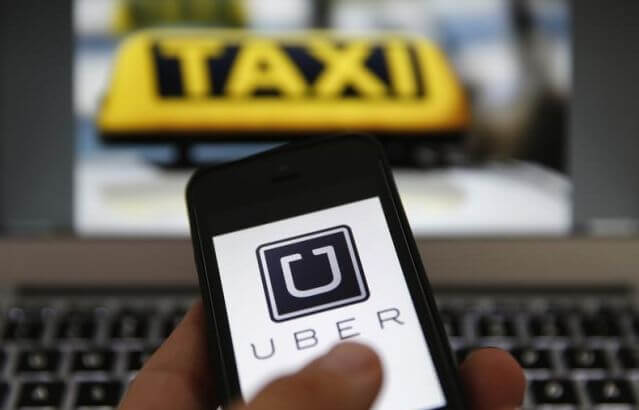Cabbies and rideshare drivers appear to be on a political collision course here in Boston.
Nowhere was the clash more evident than outside City Hall early Monday afternoon before a City Council hearing about rideshare services. The City Council is in the midst of considering regulations for such services. Before the hearing, Boston taxi drivers said they were upset with rideshare companies like UberX and Lyft, which they view as unregulated competitors that are unfairly cutting into their business.
The rideshare companies, meanwhile, batted away such assertions. They said their company offers cheaper, better alternative to cabs.
Tiffany Mitchell, who is a manager for Top Cab and City Cab, said rideshare services have harmed her industry. She single taxi medallion in Boston – there are about 1,800 of them — can cost between $500,000 and $700,000, although their value has decreased by as much as $200,000 during the last two years because of ride shares, said Mitchell. Mitchell said there are drivers who city authorities won’t allow to drive a taxi that driver Uber.
“Uber says they do background checks, but if they can’t drive for Boston, that means they’re not checking properly,” she said.
That assertion was rejected by an Uber spokesman outside City Hall. Taylor Bennett described the company’s background checks as stringent, industry-leading, more rigorous than the taxi industry. He said Uber favors “regulation that allows for consumer demand.”
Mark Nemeskal, a 55-year-old Lyft driver from Peabody whose day job is driving a truck, thought taxis were running away from market competition and summed up his thoughts regarding potential regulation succinctly: “It’s not broke so don’t fix it.” “We’re here,” he said. “We’re not going away.”
Boulos Kamel, a 57-year-old West Roxbury resident who has been driving a cab for nine years, thought rideshare regulations should mirror those of the taxi industry.
“We have to pay for our license, pay for our medallion,” he said. “With Uber, it’s like someone found an easy way around that. Do I think it’s unfair? Yeah.”
Consumers such as Bojana Rasic disagree. Rasic, a Suffolk University student, who was walking by the City Hall rally, said rideshare services simply offered a cleaner, better and cheaper service than traditional taxis. “The cabs should reinvent themselves,” she said. “We need competition. The more options for transportation, the better.”
Peter Cohan a visiting lecturer at Babson College who specialize in strategy and investment, said companies like Uber and Lyft have a clever business model: their operations are “asset light” and specialize in putting people together. “The only problem is political opposition, which limits its growth,” he said. “There may be financial links – campaign contributions – between cab companies and politicians or unions and politicians which Uber and Lyft may not have.”
Cabbies push for tough rideshare rules

Derek Kouyoumjian/Metro


















